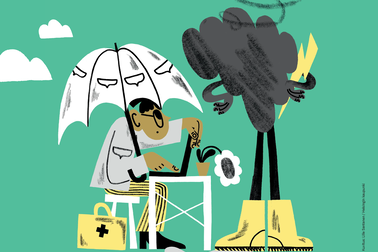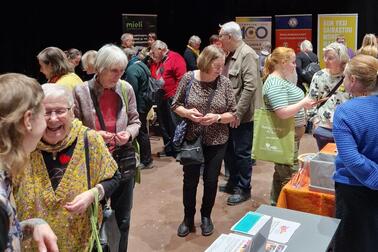
The Fiilari survey was conducted in late 2023, receiving responses from over 23,000 City of Helsinki employees. The purpose of the employee surveys is to monitor the well-being of personnel and renewal in accordance with the City Strategy. This was the second-ever Fiilari survey – the first was conducted back in 2021.
The results of the Fiilari survey are reported on a scale of 4–10 corresponding to the school grading scale used in Finland, with 10 being the highest grade. The City’s overall grade was 7.7. Daycare Centre Hippaheikki-Kajuutta-Myrskyluoto received a grade of 9.3 based on 22 respondents, whereas Kustaankartano Service Centre received a grade of 9.1 from its seven-person unit.
“We have a strong sense of community here,” says child minder Hanna Blomqvist from Daycare Centre Hippaheikki.
“And thus a well-functioning workplace culture and structures,” says early childhood education teacher Mari Vaartio from Daycare Centre Myrskyluoto.
Hippaheikki, Kajuutta and Myrskyluoto are physical activity oriented daycare centres that are located close to each other and form a single unit employing a total of approximately 30 people. Each of the three daycare centres is divided into several smaller teams, and the daycare centres also provide assistance to each other whenever necessary. As one of their strengths, Vaartio also mentions the fact that the daycare centres have several employees who have been working there for a long time.
“We understand that not every year is the same. Some years might be more difficult for some teams, but if you work long enough, you realise that not every year is as challenging,” Vaartio says.
The Fiilari survey highlighted community cohesion as the most important factor contributing to occupational well-being. It is also one of the strengths of Kustaankartano Service Centre, where social instructor Tuula Sillanpää and physiotherapist Jenni Hämäläinen have been working for almost twenty years.
“We have long been doing the kind of work that we all enjoy. I like coming to work every morning. My coworkers are not just coworkers, as we can talk about anything and everything,” Hämäläinen says.
“Everyone has the occasional bad day, but you are allowed to say it out loud. We respect each other and do not take things out on each other,” Sillanpää continues.

Meaningful work is a motivator
The second most important factor contributing to occupational well-being highlighted by City employees in the Fiilari survey was meaningful work. All the respondents from Hippaheikki-Kajuutta-Myrskyluoto feel their work is meaningful.
“This work is so important and it motivates us,” says Blomqvist.
“Having crystal-clear objectives makes work more meaningful. We want to develop instead of staying in place. We are always learning new things,” says Vaartio.
Blomqvist and Vaartio’s unit boasts a higher level of occupational well-being than the City’s work communities on average. At their unit, 77% of respondents also feel that they are able to recover from work stress between workdays, whereas at the City level, only 41% respondents feel this way.
“Stressful situations are not something that you can ever completely avoid, but we try to tackle them as quickly as possible to ensure that no one is overwhelmed,” Vaartio says.
According to Vaartio, other factors contributing to their unit’s high occupational well-being include management support and encouragement, solution orientation and the fact that everyone at the unit feels that the members of the working community help each other and succeed together. She goes on to add that the fact that the employees at their unit spend so much time outdoors and engaging in physical activity at work must also play a part.
“Of course things get busier if people fall ill. But we all pull together and think about how to tackle the situation,” Blomqvist says.
Students coming to work at the service centre are positively surprised
According to Sillanpää and Hämäläinen, who work at Kustaankartano Service Centre, the challenges of the health and social services sector are reflected in their work in the fact that working with older people is not always seen as the most appealing option, for example.
“The physiotherapy students coming to work at our unit have rarely considered working with older people to be their number one choice. It is quite fun to be able to positively surprise them and get them to understand what a narrow view of working with older people they have had. Back as a graduate, even I didn’t think that I would find myself working with older people,” Hämäläinen says.
According to Sillanpää, work at her unit is also not the same all the time, as she gets to influence and plan her own work.
“We are trusted,” she says.
According to Hämäläinen, she finds that she does meaningful work every day.
“This job offers plenty of opportunities to flex your creative muscle and utilise a wide range of skills,” she says.
75% of respondents would recommend Helsinki as an employer
One of the positive results of the Fiilari employee survey was that 91% of employees feel that the members of their work community help each other and succeed together. However, the survey also revealed that while some employees are doing very well, others are doing very poorly: 21% of respondents received a grade of 10 for occupational well-being, while 37% received a grade of 4. On the other hand, it is positive that 75% of respondents would recommend Helsinki as an employer to a friend.
“It is great to see that the willingness to recommend Helsinki is increasing again. The challenges that we faced last year clearly damaged employee trust and commitment, which is understandable, but now things are going back to normal,” says HR Director Petri Lumijärvi.


